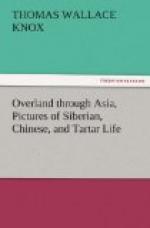We had two rooms with a bedstead and sofa, besides lots of chairs, mirrors, tables, and flower pots. Then we had an apartment nearly thirty feet square, that contained more chairs, tables, and flower pots. In one corner there was a huge barrel-organ that enabled me to develop my musical abilities. I spent half an hour the morning after our arrival in turning out the national airs of Russia. Molostoff amused himself by circulating his cap before an invisible audience and collecting imperceptible coin. While dancing to one of my liveliest airs he upset a flower pot, and the crash that followed brought our concert to a close. Two sides of the large room were entirely bordered with horticultural productions, some of them six or eight feet high.
[Illustration: AMATEUR CONCERT IN SIBERIA.]
Troitskosavsk and Kiachta have a sort of husband and wife singleness and duality. They are about two miles apart, the former having five or six thousand inhabitants and the latter about twelve hundred. In government, business, and interest the two places are one, the Master of Police having jurisdiction over both, and the merchants living indifferently in one or the other. Many persons familiar with the name of Kiachta never heard of the other town. It may surprise London merchants who send Shanghai telegrams “via Kiachta” to learn that the wires terminate at Troitskosavsk, and do not reach Kiachta at all.
The treaty which established trade between Russia and China at Kiachta provided that no one should reside there except merchants engaged in traffic. No officer could live there, nor could any person whatever beyond merchants and their employees and families remain over night. No stone buildings except a church could be erected, and visits of strangers were to be discouraged. Kiachta was thus restricted to the business of a trading post, and the town of Troitskosavsk, two miles away, was founded for the residence of the officials, outside traders, and laborers. Most of the restrictions above mentioned exist no longer, but the towns have not quite lost their old relations. There is an excellent road from one to the other, and the carriages, carts, and pedestrians constantly thronging it present a lively scene.
The police master tendered his equipage and offered to escort me in making calls upon those I wished to know. Etiquette is no less rigid in Siberian towns and cities than in Moscow and St. Petersburg. One must make ceremonial visits as soon as possible after his arrival, officials being first called upon in the order of rank and civilians afterward. Officers making visits don their uniforms, with epaulettes and side arms, and with all their decorations blazing on their breasts. Civilians go in evening dress arranged with fastidious care. The hours for calling are between eleven A.M. and three P.M. A responsive call may be expected within two days, and must be made with the utmost precision of costume.




